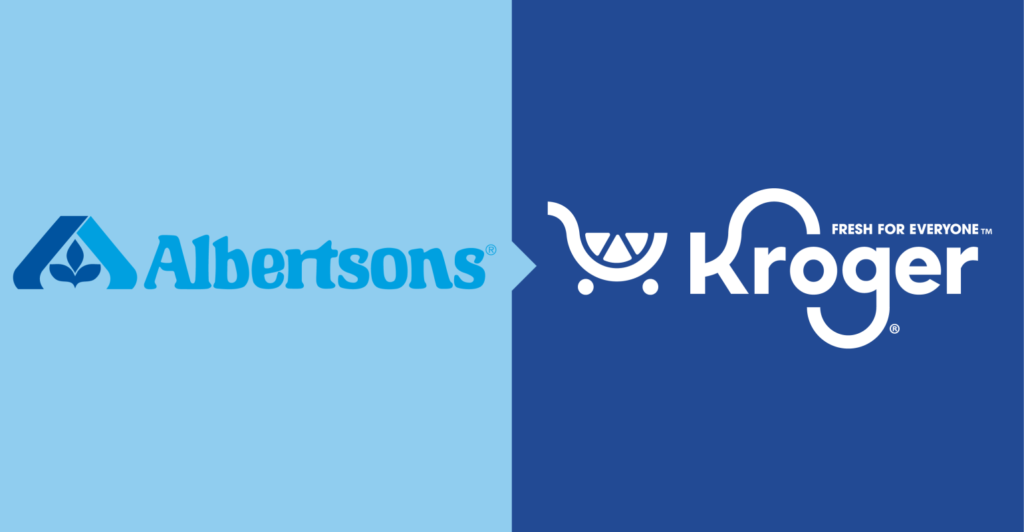As the proposed Kroger-Albertsons megamerger undergoes what we expect is the first of many regulatory challenges, we — a rank-and-file grocery worker and a local union president — feel strongly that the government must take decisive action to block this corporate power grab.
On Monday, Jan. 15, Washington State Attorney General Bob Fergusson did just that, as he filed a lawsuit highlighting the proposed merger’s many flaws, including the dubious plan to divest at least 413 stores to C&S Wholesale Grocers, forcefully arguing that C&S would be far too small of a player, unable to compete effectively against a newly expanded Kroger over 10 times its size.
We agree. There are concerning similarities between this proposed divestiture plan and the disastrous divestiture of stores to Haggen as part of the 2015 Safeway and Albertsons merger. We lived that Haggen experience directly. As a deli clerk at what became a Haggen store, I (Monique) ultimately lost my job, my medical benefits, and had to give up my apartment and move in with my mother when Haggen went bankrupt. As a union leader, I (Kathy) had to scramble to help thousands of workers find new jobs and then find ways to keep our pension and welfare funds afloat after the sudden loss of so many member participants.
But today, Kroger and Albertsons are working overtime to tell a different story about C&S Wholesale Grocers, and Albertsons has hired a high-priced investment banker to vouch for C&S. His name is Scott Moses, and he recently argued via that to compare the C&S divestiture with the 2015 sale to Haggen is “demonstrably false,” and even “shamefully mislead[ing],” because, he said, the two companies are “entirely different in every important way.” In his December Supermarket News op-ed, Moses wrote that Haggen “failed abysmally” because of obvious problems like a weak balance sheet, an unknown brand, and an inexperienced management team. C&S, he claims, has none of these problems.
But Moses is leaving out one important fact: he was Haggen’s financial advisor during the 2014-15 divestiture transaction that he now trashes as an abysmal failure.
Moses has consistently failed to disclose his role as Haggen’s advisor during the doomed 2014-15 divestiture, a role which provided him a unique ability to understand the weakness of the company’s balance sheet, and the limits of its brand — the very same weaknesses he now criticizes. As for the inexperience of Haggen management, we assume Moses would have been able to assess that during his regular meetings with them. As to why he did not share this important information at the time we can only speculate.
Was it because he was being paid regardless of whether the risky expansion worked? Was it because he suspected that even if Haggen failed, he would be paid again to advise the company when it sold many of the same stores back to Albertsons a few months later, as he was? We don’t know why Moses consistently failed to disclose his role advising Haggen on the disastrous 2015 transaction — when he also trashed the Haggen deal in his 2023 presentation at GroceryShop when he asserted that the Kroger, Albertsons merger would result in no store closures and no job losses, or in his bio on the Solomon Partners website which lists dozens of other deals, large and small — but it’s a question we’ll be raising with regulators.
For the record, there are many more things Scott Moses is forgetting to tell us including that C&S has no significant retail operations experience, including none in California, Oregon, Washington, Colorado, or the other states where the majority of the divested stores are located. He hasn’t mentioned that C&S has a record of acquiring stores only to establish long-term supply agreements with them and then sell them off again and, in a number of cases, these stores were soon closed and/or their owners filed for bankruptcy. Nor has he pointed out that the credit agency Moody’s has given C&S a “speculative” (Ba3) rating, which indicates “substantial credit risk.”
There are more omissions from Moses, such as the fact that C&S is getting a very good deal on the divested stores, buying them for a price that is significantly below what we estimate the real estate alone to be worth. The same situation encouraged Haggen’s owners to take on more risk than they should have and led them to structure the deal in a way that allowed them to carve out the real estate value from the retail operating company, leaving our members and other creditors in the lurch when Haggen filed for bankruptcy. (Presumably, as Haggen’s financial advisor at the time, this real estate structure is something Moses knows quite a bit about.)
As a frontline grocery worker and a local union president — as two community members who care about the future of healthy, affordable food where we live — we call on regulators to see through the dubious claims of the hired guns and block this merger.
Better yet we call on Kroger and Albertsons to abandon this doomed merger before they divest themselves of their remaining credibility.
Kathy Finn, president of UFCW 770, Los Angeles, Calif.
Monique Hightower, grocery store worker at Albertsons in Los Angeles and a member of UFCW 770.


